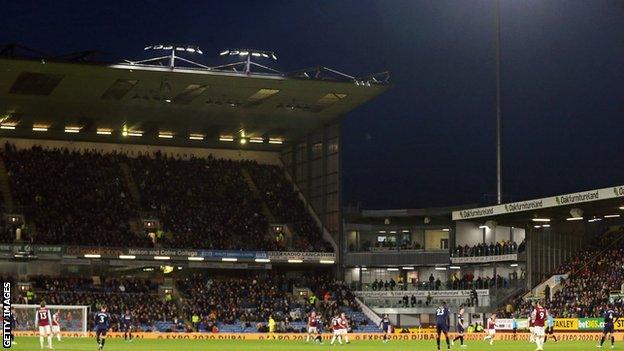Football hate crime reports increase by 66% in England
- Published

Premier League club Burnley have played at Turf Moor since 1883
There was a 66% rise in hate crimes reported at professional football games across England and Wales last season, according to Home Office figures.
Incidents reported rose to 194 in 2018-19 and of 323 reports in the past two seasons, 230 related to racism.
With 12 incidents reported, Burnley had the most of any club last season.
However, the club say the data reflects their proactive approach to self-policing and a 'zero-tolerance policy towards any form of discrimination'.
Sunderland had the second-most reported incidents with 11 while there were 10 such reports at Manchester United.
The data was collected from a Freedom of Information request to the Home Office by the Press Association - it does not specify whether complaints were made by fans of the home or visiting team.
Reports of incidents were submitted to the UK Football Policing Unit (UKFPU) by police dedicated football officers (DFOs).
What were the findings?
Burnley had the largest combined number of reported incidents (17) over the last two completed seasons
Nineteen clubs had no reported incidents of discriminatory behaviour over the same period
Leeds United and Manchester City had the highest number of reported cases (6) in 2017-18
Burnley had the highest number of reported cases (12) in 2018-19.
There were 129 reports of discriminatory behaviour in 2017-18, but there were 194 the following campaign - a 66% rise
Of the 323 cases reported over the two seasons, 230 were related to racial abuse
Of the 194 cases last season, 140 were related to racial abuse
What do the clubs say?
Burnley said they were "aware" of the findings and that they are taking a "pro-active stance on such issues".
"As a club we operate a zero-tolerance policy towards any form of discrimination at Turf Moor and amongst our supporters at away matches," said a club statement.
"We actively encourage our supporters to report any relevant incidents, including those suspected from our own fans, which we believe is reflected by the number of reports made.
"Going back to 2016 we supported our former player, Andre Gray, who criticised two Burnley supporters for allegedly using racist comments in a match at Bradford."
Sunderland and Manchester United also released statements to encourage supporters to report any abuse they witness.
A statement from Sunderland said: "We pride ourselves on the Stadium of Light being an inclusive venue.
"We work with the police to ensure all evidence is passed to them so they can pursue criminal prosecutions wherever possible."
A United spokesperson said: "There is absolutely no place for discrimination within our game, or in society as a whole. We will continue to take strong action against anyone who we identify has engaged in racist or discriminatory abuse, either online or at our matches."
What is the response?
In response to the findings, anti-discrimination group Kick it Out said the rise in discrimination was a "challenge for all clubs, at all levels, across the country".
"Reporting mechanisms, such as club procedures and our Kick It Out app, as well as the communications around these, are gradually improving. So, an increase in reporting figures is to be expected," said the body in a statement.
"We continue to urge anyone who is a victim or witness of abuse to report it. We encourage clubs to continue building on the good work they have already done in creating effective reporting mechanisms.
"Currently, discrimination, diversity and inclusion data is fragmented across clubs, governing bodies, charities and law enforcement. Working together as a football community, we need to create more robust and comprehensive data to gain a more accurate picture of the problems and create more targeted solutions."